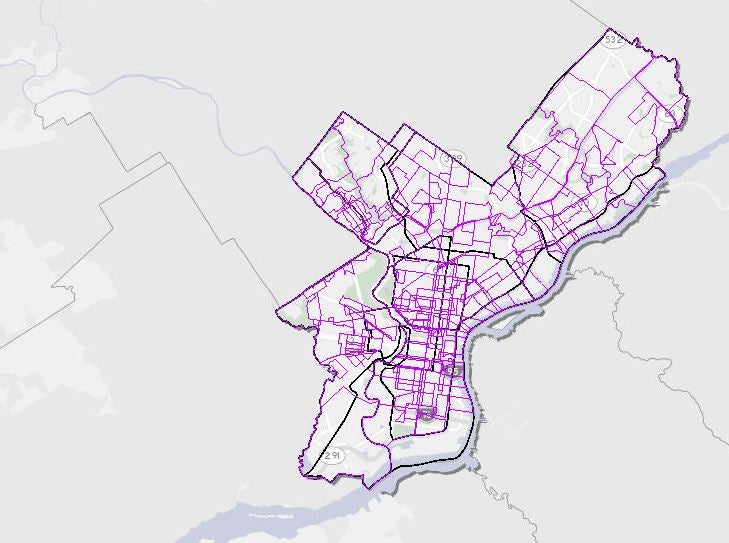Some civic associations seek tighter regulation of Registered Community Organization map

Amid arguments over the new zoning code’s provision on Registered Community Organizations over the past few years, the Philadelphia City Planning Commission vowed to stay out of neighborhood power struggles by treating equally all qualified RCOs whose boundaries happen to overlap. But now, just a few weeks after PCPC released its RCO map, some civic organizations are asking the Commission to tighten those qualifications and “rationalize” the map.
Last Thursday, representatives of 15 local RCOs sent a letter to Deputy Mayor Alan Greenberger saying that the map is unnecessarily confusing, and asking for it to be updated “to more accurately reflect traditional and well-functioning neighborhood association boundaries across the city.”
The letter continued, “If the notion of a “local” RCO is to have any meaning, it seems to us that it inheres in the neighborhood-specific knowledge and experience accrued by residents and the leaders of the civic associations … We urge the PCPC to include criteria such as boundaries specified in organizational by-laws, traditional practices, openness of the organization to community participation, and so forth.”
Opening its first round of registration in June, the Planning Commission asked applicants to submit their boundaries—no less than five square blocks in area—along with contact information, a mission statement, and any governing documents, per the requirements set forth in the new zoning code. The code says that an RCO’s boundaries must match those set forth in its governing documents.
Jeff Hornstein, who signed the letter as president of Queen Village Neighbors Association, said that some of the resulting Local RCO boundaries represent an overreach. The associations’ letter pointed out that the Center City District, listed as a Local RCO, claims Girard to Tasker and the Schuylkill to the Delaware rivers as its boundaries, overlapping dozens of smaller organizations. On a smaller scale, Hornstein said, groups with less history of working on zoning issues with developers have been given the same standing as more established neighborhood associations.
Alan Greenberger could not be reached for comment, but Eva Gladstein, deputy director of the Planning Commission, said that in the case of Center City District, that group simply wanted to get notice of new developments—not to encroach on the efforts of smaller organizations. She said there currently is no mechanism to simply require notice to but not meetings with certain groups, though she said that may need to be raised as an amendment to the zoning code in the future.
Gladstein also suggested that the letter from civic associations might be premature.
“I understand their concern,” she said, “but I think right now there’s a concern but there’s no history. There may be a problem, but we don’t know that there’s a problem.”
The letter goes to the heart of a discussion that played out again and again over the course of the zoning reform process. Many organized groups with histories of working with developers wanted the RCO provision to be restrictive, so that “fly-by-night” groups couldn’t pop up and complicate the process with small but vocal opposition. Other groups felt that having Registered Community Organizations at all would unfairly advantage better-organized groups at the expense of small ones that nonetheless care about their neighborhoods.
Gladstein said the Zoning Code Commission tried to strike the right balance. The RCO provision requires that developers notify and meet with registered groups when planning projects in their neighborhood. But it doesn’t prevent anyone from testifying before the Planning Commission or the zoning board, nor does it favor the views of any particular group. Gladstein said that the Commission has received lots of feedback since releasing the RCO map saying that the selections were both too restrictive and not restrictive enough.
Hornstein’s position is clear.
“Either you have no RCO process and anyone can get up and participate, or you have some criteria,” he said. “To me, having meaningless criteria is worth than nothing.”
In June, at the end of City Council’s spring session, Councilwoman Jannie Blackwell introduced a resolution calling for hearings on the Registered Community Organizations provision of the code. Blackwell said she called for the hearings to make sure the code wasn’t unfairly favoring some groups over others.
“Because you’re new doesn’t mean you’re not legitimate,” Blackwell said. “Because you’re less than five blocks doesn’t mean you don’t get a say in what goes on in your neighborhood.”
The hearings will begin at a Rules Committee meeting on Tuesday, October 2, at 10 a.m.
Note: this article has been updated to reflect the fact that the zoning code says an RCO’s registered boundaries will match those identified in its governing documents.
Contact the reporter at jaredbrey@gmail.com and follow him on Twitter @jaredbrey
WHYY is your source for fact-based, in-depth journalism and information. As a nonprofit organization, we rely on financial support from readers like you. Please give today.



